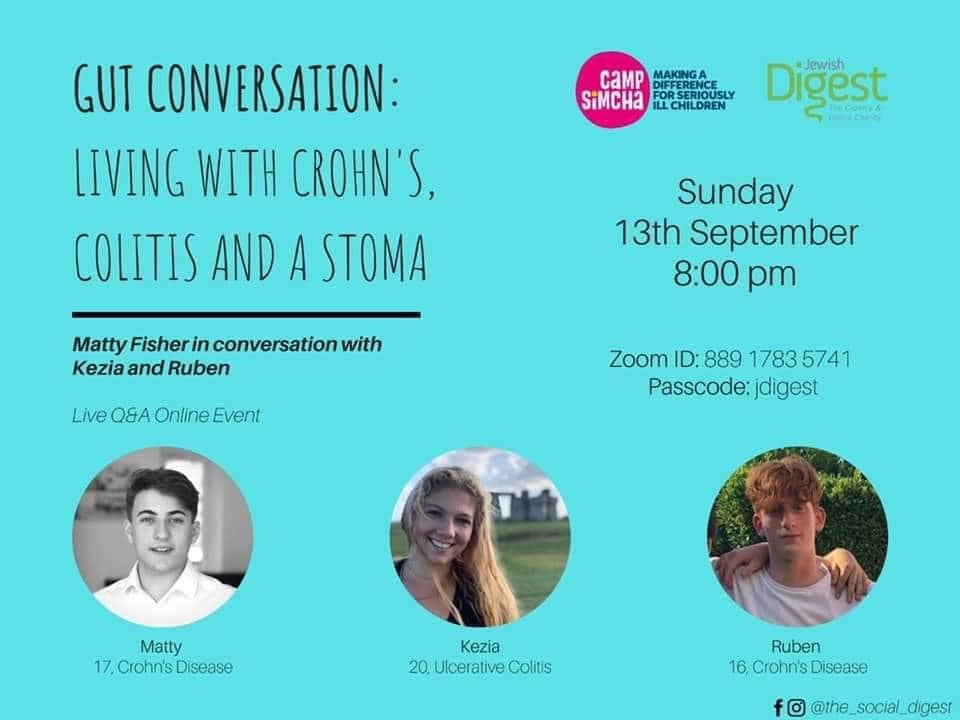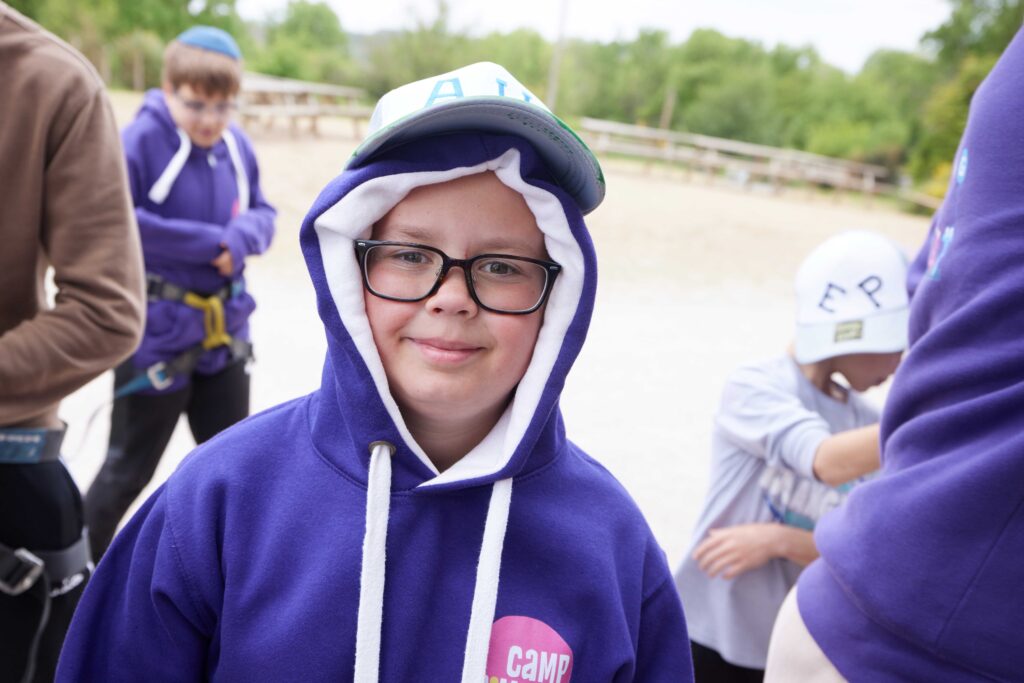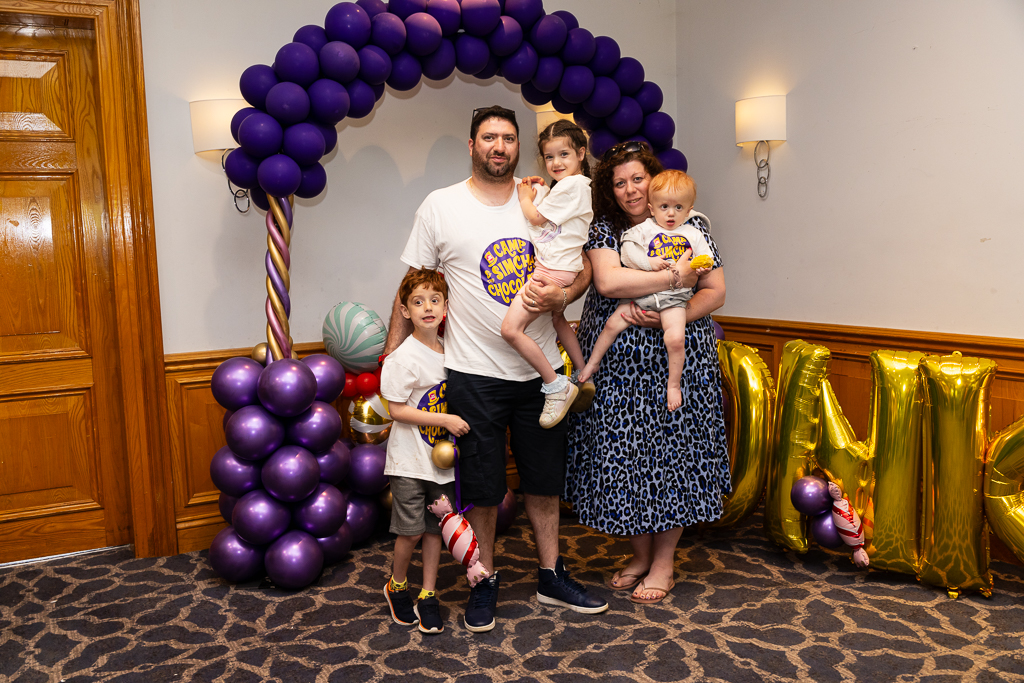WHILE MOST 12-year-old Jewish boys are focused on practising for their barmitzvah and enjoying the celebrations with their peers, Ruben Wapnick was struggling with early Crohn’s disease symptoms.
“Everything I ate went through me and I was in constant pain,” says Ruben, now 16.
“At that point I thought I had a sensitive stomach and dairy intolerance. As time went on I also began to feel quite tired; I would be at friends’ barmitzvahs on the dance floor but feeling physically terrible.”
However, it was not until almost 18 months later that Ruben was diagnosed.By this time, he was coping with debilitating fatigue and significant weight loss.
Now in remission from his condition, thanks to medication, diet and lifestyle changes, Ruben joined 21-year-old Kezia Sinclair-Horne for an online event hosted by Camp Simcha and Jewish Digest to raise awareness and share their experiences to help others coping with Crohn’s and colitis.
Camp Simcha has been supporting children with various serious and life-changing medical conditions for 25 years and for the past few years it has been helping families who have a child with Crohn’s, colitis and serious gut conditions.
Jewish Digest is a gut health charity raising awareness and running events for people living with IBD. It offers a buddy system, putting people in touch with others who are going through similar experiences.
In conversation with Matty Fisher, 17, a Jewish Digest young ambassador who recently made a documentary about his Crohn’s journey, they stressed the importance of talking openly about inflammatory bowel diseases, conditions more commonly found among the Ashkenazi Jewish population.
In the case of year 12 Yavneh student Ruben, it was following a school Israel trip, almost a year after his barmitzvah, that he and his family began to push for a diagnosis.
“We knew something wasn’t right. I came back from the two-week trip, having lost a stone in weight and, at points, not having enough energy to get through the day, but I didn’t know why. Most days when I got home from school I would collapse on to my bed.
“Finally, in October, I went to the doctor. After various tests I was diagnosed with Crohn’s disease. I cannot stress enough how important it is to get help when you are not feeling right and to push to get a diagnosis.”
Nearly two years later, Ruben, who has gained back two stone in weight and is feeling “full of energy”, set up an Instagram page @crohns_disease_warrior to share his story about this “invisible” condition — and to encourage other sufferers to keep positive about their situation and remember it is not something to be ashamed of.
As well as taking medication — Azathioprine, an immunosuppressant and fortnightly injections of Adalimumab — Ruben went on a diet of dairy, meat and eggs but no carbohydrates. He also forced himself to keep exercising, which he says was a battle of mind over matter at the height of his fatigue.
“The bad days are horrible; the bad days make you want to give up and give in, but everyone has their battles. This was mine and you have to fight to be stronger than what you are up against.”
Kezia, who has ulcerative colitis, which affects the large intestine (while Crohn’s can appear anywhere in the digestive tract) was diagnosed while she was taking her A-levels.
She was treated with a variety of medications, but ultimately her condition resulted in her cutting short her gap year, returning home after only two and a half months away.
“For many the medications work really well, but unfortunately that wasn’t the case for me,” says Kezia. “After more than a year of trying different treatments, including immunosuppressants, I decided to have stoma surgery, which diverts the colon through to an opening in the abdomen for waste to exit your body, rather than going through the digestive system.”
Kezia had the surgery in December last year and says she has not looked back.
“Surgery is generally a last resort, because medications can work really well. For me, after being unwell for so long, I was ready to take back control of my body. I was terrified at the prospect, but I wanted my life back and this is exactly what has happened.”
To prepare herself for surgery, Kezia turned to social media.
“I began following two Youtubers who had stoma bags. I watched all their videos so I knew it was going to be tough, but it also meant I knew what to expect. The nurses were great and I had a really good physio in hospital; recovery took me about six weeks.
“Now the stoma doesn’t restrict me at all. Before surgery I couldn’t eat what I wanted and I couldn’t go out without knowing where the nearest bathroom would be. Now I can eat almost everything and I don’t have the chronic fatigue, which is a great thing. The stoma surgery has not held me back in any way and I am happily enjoying university.” Kezia stresses the importance of raising awareness about this invisible disease. “Not every illness is obvious to others. I have had dirty looks so many times if I am coming out of a disabled bathroom, which is wrong. But also, within the Jewish community, it is important people know about IBD because genetically it is more prevalent.”
Daniel Gillis, Camp Simcha head of services, praises Ruben and Kezia for sharing their story.
“They are very impressive young people, who found benefit in accessing online support and sharing their experiences with others in their situation. I hope their openness will encourage other young people to speak out and access the support which is out there for them.”
Deborah Eckstein, co-founder of Jewish Digest, says events like these are vital to help increase awareness in the Jewish community.
“IBD can be very debilitating and crushing for a young person. The least we can do is try to reduce the stigma and ‘normalise’ talking about gut health.”
If you or someone you know could benefit from Camp Simcha’s support, call 020 8202 9297 or email help@campsimcha.org.uk in the strictest confidence. Jewish Digest is on social media @The_social_digest or get in touch via jewishdigest.org




